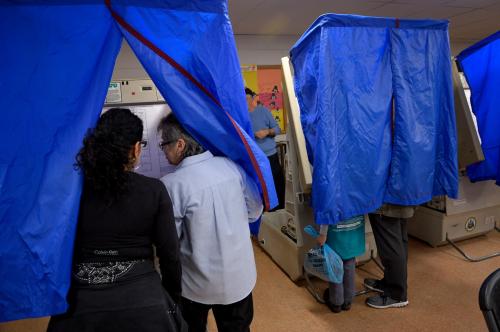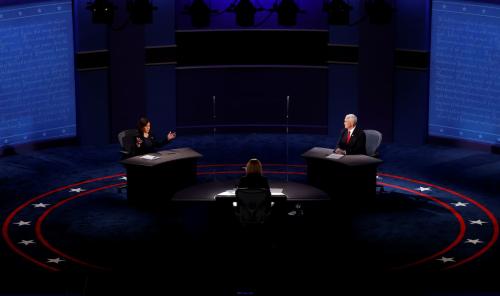To the surprise of many Americans, the vice presidential debate was civil, substantive, and focused on the policy issues that people care about the most. The candidates refrained from personal attacks and even found surprising areas of agreement. Citizens interviewed right after the debate ended expressed their appreciation for a debate that wasn’t painful to watch and actually stuck to major issues.
This was not the only surprise. When the two candidates for vice president came out on stage last night, America had certain expectations based on the campaign so far. Neither candidate lived up to expectations, which was good news for the Republican nominee, Sen. J.D. Vance (R-Ohio) and not so good news for the Democratic nominee, Governor Tim Walz.
In the weeks before their debate, Vance had become known for two things, both of them fitting firmly into Walz’s characterization of Trump Republicans as “weird.” On July 22, a clip of Vance’s interview on Fox News from 2021 was posted. In it, Vance attacks women who do not have children, suggesting that the “childless cat ladies,” as they’ve become known, do not have the same stake in America as do people who are parents. The internet went wild, mega star Taylor Swift identified as a childless cat lady in her endorsement of Kamala Harris, t-shirts were printed, and memes proliferated. As if the cat lady stories weren’t trouble enough, Vance followed this up by defending unsubstantiated claims from Springfield, Ohio that Haitian immigrants were stealing and eating their neighbors’ cats and dogs.
In contrast, Walz spent the weeks before the debate doing what most VP candidates are supposed to do—no harm. And a little good too. Following up on the Midwest Dad, football coach demeanor he so skillfully deployed at the Democratic convention, Walz cut what will surely go down in history as one of the best political commercials ever. The ad features him telling the viewers how to fix the cruise control on his 1979 International Harvester Scout, interspersed with comments on Harris’ opportunity economy. It was widely shared on social media with nearly one million posts so far.
As the debate opened, Vance took the stage as a historically unpopular VP candidate. Soon after his convention, his unfavorable ratings were 29.3%, and by the time of the debate, they had risen to 45.5%. In contrast, Walz’s unfavorable ratings on the eve of the debate were 36%—a 9.5% better rating than Vance.
But slightly different candidates than expected showed up on the stage in New York. Vance was not at all “weird”; he didn’t mention cat ladies or Haitian immigrants eating pets. His demeanor and his calm recitation of his positions did him a lot of good. There was plenty to disagree with, and there were times when he pushed the truth. His efforts to sound more moderate probably made some of the far-right supporters angry, but it was all delivered as smoothly as you would expect by a polished debater and Yale Law School grad.
But if weird Vance didn’t show up, neither did genial Walz. He was clearly nervous, talked too fast, rarely smiled, and his sense of humor didn’t come through. So here too the expectations were not met. Had the Walz of the debate been the Walz of the Harvester commercial, the debate might have been the smooth-talking lawyer versus the commonsense man.
Although the immediate flash polls on CNN and CBS showed that both candidates helped themselves, Vance improved his image and Walz didn’t help himself as much as he could have. Substantively, Vance did a better job than Walz in three important ways: He was on the attack on what he called the “Harris-Biden” administration, he offered an articulate defense of his presidential candidate’s record in office, and he constantly brought the questions back to the economy and immigration, the two principal issues on which Trump enjoys an advantage over Harris. In contrast, Walz’s response to each question were less clear, which probably made it harder for viewers to frame an easily remembered impression.
On specific issues, both candidates had areas of strength. Vance excelled on immigration, the economy, and foreign policy, and he managed to sound reasonable on abortion, taking the edge off one of his ticket’s key weaknesses. Walz was strong on gun safety, housing, and health care. He may have had his strongest moment at the end of the debate when the discussion turned to January 6 and preserving democracy. Whatever his private views may be, Vance would not admit that Joe Biden won the 2020 election, which attracted lots of post-debate attention and may have dented the armor of reasonableness and common sense that he wore to the debate.
In the past, vice presidential debates have had little measurable impact on the presidential choice. This time could be different, in part because this is the first vice presidential debate not to be followed by a presidential debate. It is the last formal exchange between the candidates of the two parties that the public is likely to hear, which may give it more staying power than in the past. And because the 2024 election is balanced on a knife’s edge, even a small shift could affect the outcome.
However, the debate may have been most consequential for the future of the Republican Party. If Trump loses the election, Vance’s performance will strengthen his credentials as the next-generation leader of the MAGA movement. And if Trump wins, Vance’s standing as the heir apparent will be even stronger. In just 90 minutes, Vance transformed himself from an object of ridicule into a man with a bright future.
The Brookings Institution is committed to quality, independence, and impact.
We are supported by a diverse array of funders. In line with our values and policies, each Brookings publication represents the sole views of its author(s).








Commentary
Why the vice presidential debate was not what voters expected
October 2, 2024